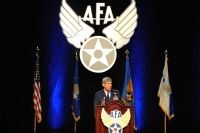NATIONAL HARBOR, Md. — Air Force leaders are focused on managing potential budget constraints so that the service can continue to provide its unique contributions to national security, the Air Force chief of staff said yesterday.
Speaking before hundreds of attendees at the Air Force Association’s 2011 Air and Space Conference and Technology Exposition here, Gen. Norton A. Schwartz said service leaders will not allow budget pressures to create a future force that “merely appears on paper to be effective, but in reality is reduced substantially in depth and breadth.” Schwartz said the Air Force’s core contributions reside in four main areas: control and exploitation of the air and space domains, as well as mission assurance in cyberspace; global strike; rapid global mobility; and worldwide intelligence, surveillance and reconnaissance.
These four contributions are enhanced by the Air Force’s superior command and control networks, Schwartz said.
“In any budget scenario, we will be required to continue providing capabilities that offer the nation’s leaders a wide range of strategic options for rapid and flexible power projection,” Schwartz said. “Our core contributions enable America’s global perspective and result in appropriately tailored effects at times and places of our choosing.”
The Air Force’s unique capabilities are essential for the nation’s strategic interests, economic prosperity and military readiness, Schwartz said, describing the United States as an “air and space nation.”
“So as we may have to carefully consider reduced capacities in some areas while maintaining, and perhaps increasing investment in others, we must carefully consider and calibrate our acceptance of risk, manifested in a force that’s smaller in size and scale,” he said.
Such “difficult choices,” will extend into the Air Force’s procurement programs, the general said. Future development efforts will have to be less ambitious, and government and industry must appraise and adhere to genuine operational requirements and evaluate manufacturability early.
“We require straight talk from everybody,” Schwartz said. “Government must ensure stable requirements and reliable funding streams, while industry must bid according to realistic estimates, and resist offering to sell more than what is operationally required.”
The Air Force’s acquisition corps is ready for such challenges, given the progress it has made over the last three years, he said.
“Although we will always be accountable for responsibly expending hard-earned and precious taxpayer dollars, we can regard our acquisition processes and procedures as having achieved a notable restoration of effective control and oversight,” Schwartz said.
Another area the Air Force has made similar progress in since 2008 is the nuclear enterprise. “Without resting on our laurels, we can be proud of the result: a nuclear enterprise that is renewed and focused on its commitment to avoiding critical performance shortfalls,” he said. “Our work in this critical area remains worthy, valued and essential to our nation’s security.”
To maintain such excellence across the Air Force, the general said the service will intensify its efforts to develop airmen, “arming them with intellectual and experiential strength that is on par with the advanced capabilities that our weapon systems provide.”
Schwartz acknowledged the excellence displayed by all airmen by recognizing the achievements of Staff Sgt. Robert Gutierrez Jr., a joint terminal attack controller who, despite suffering serious wounds, helped save his Special Forces team in Afghanistan during a Taliban attack by expertly calling in air strikes.
Secretary of the Air Force Michael B. Donley recently approved the awarding of the Air Force Cross, the service’s highest military honor, to Gutierrez, Schwartz announced during his remarks.
While airmen face a future of fiscal and operational challenges, Schwartz said he remains confident that the Air Force will remain ready to defend the nation and its freedoms.
“The U.S. Air Force will be prepared for whatever the nation requires of us,” he said. “We will provide the many utilities of airpower, as only airmen can provide it: vital in the national context and indispensable in the proud pursuit of our nation’s interests.
“We will be there for our joint teammates and for the nation,” he continued. “We will do it, or we’ll die trying.”
Source:
U.S. Department of Defense
Office of the Assistant Secretary of Defense (Public Affairs)

 von
von 